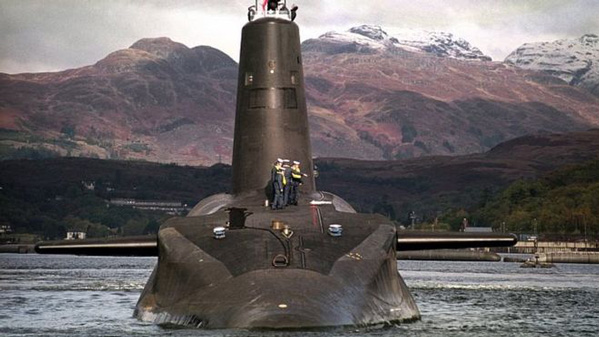England to Replace Nuclear Submarines

On Monday July 18, the British parliament voted in favor of building four new nuclear-powered submarines to carry US Trident missiles armed with modernized nuclear warheads for the next half century. I’ve reported here before, that the US, alone among the nuclear weapons states, “leases” US-designed and manufactured Trident ballistic missiles to the British Royal Navy for its large submarines. And while our State Department, White House and Congress threaten sanctions and even military attacks against other states who toy with nuclear weapons proliferation, the US stands alone in open violation of the Nonproliferation Treaty (NPT) Article I by spreading its nuclear weapons to England and five other European countries.
The British vote effectively means the UK intends to possess and deploy nuclear weapons, threatening other countries with annihilation and exposing its people to serious risks of radiation accidents, weapons use or attacks for another generation or more.
The same day UK Defense Secretary Michael Fallon said that nuclear weapons are needed to deter all threats, including from IS, and terrorism, and that the UK needs to possess weapons of mass destruction. Theresa May, the new Prime Minister, said the day before that nuclear threats against Britain had “increased” and that saving the billions of pounds to be spent building four new submarines would be a ‘reckless gamble” with the country’s “ultimate safeguard” or “insurance.”
Critics in the Campaign for Nuclear Disarmament and around the world have pressed for years for the permanent retirement of the British Trident. Pro-nuclear arguments serve hypocritically to encourage weapons proliferation and contradict England’s commitments to the NPT.
The British decision to continue its possession and threatened se of nuclear weapons of mass destruction comes at a time when much of the rest of the world is moving towards prohibiting these weapons outright. In May,over 120 states endorsed the international “humanitarian pledge” and diplomatic proposals for starting negotiations on a treaty banning nuclear weapons in 2017 that were made at the United Nations working group on multilateral nuclear disarmament. It’s possible that the UN General Assembly will vote on starting such negotiations in October.
The UN working group will make recommendations to the UN General Assembly on a treaty banning nuclear weapons this August. The British government decided to boycott this working group even after being given the right to veto the conclusions of the discussions and the recommendations agreed to by the majority of states.
Labor Party Leader Jeremy Corbyn had argued that replacing England’s nuclear submarines violated the country’s responsibilities under the NPT which requires good-faith negotiations for the abolition of nuclear weapons. Corbyn said the UK could set a global example by giving up its nuclear arsenal, much the way that US President George H. W. Bush unilaterally removed US nuclear weapons from surface ships. (Russia responded in kind soon thereafter without any need of lengthy treaty negotiations.) Corbyn ultimately lost three-quarters of his party members in the vote when they joined the government position to spend the
Beatrice Fihn, Executive Director, International Campaign to Abolish Nuclear Weapons, said of recent progress on a treaty ban,”A treaty banning nuclear weapons, even without the participation of nuclear armed states, will delegitimize and stigmatize nuclear weapons. It is a significant opportunity to change the way nuclear weapons are perceived in the international community, which will in turn transform the debate in the parliaments of nuclear weapon states.”